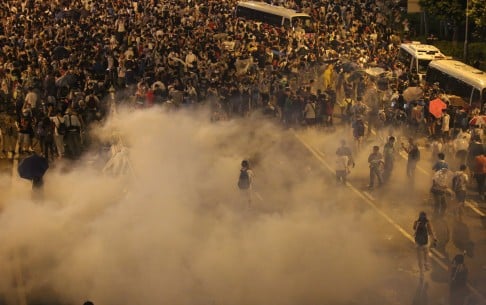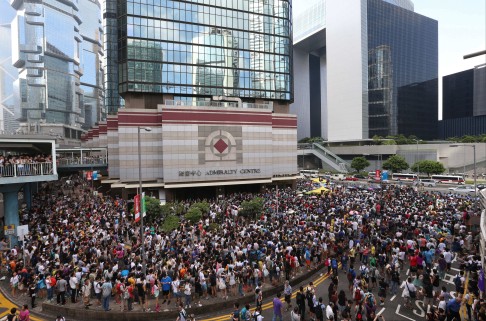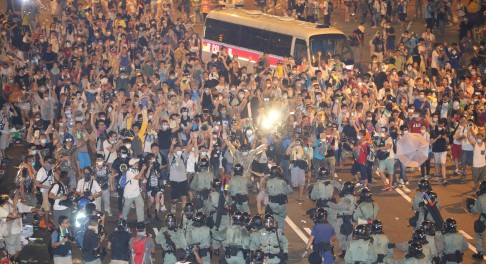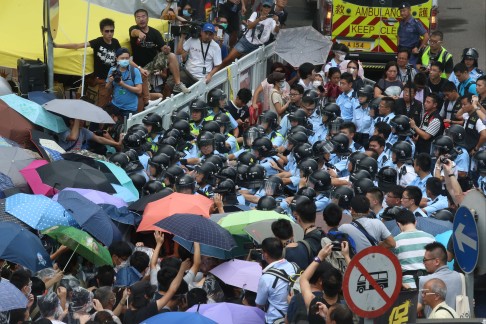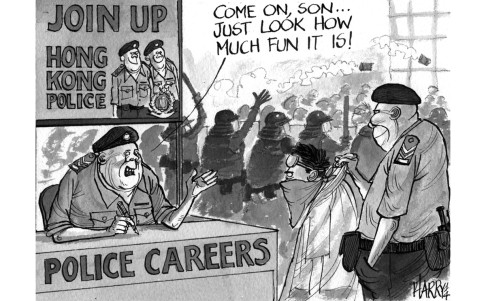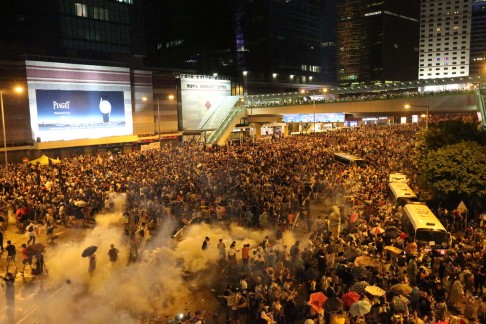
Police fire tear gas and baton charge thousands of Occupy Central protesters
Union leaders call for strikes as police defend hard-line response and Benny Tai admits protest movement's leaders are not in control
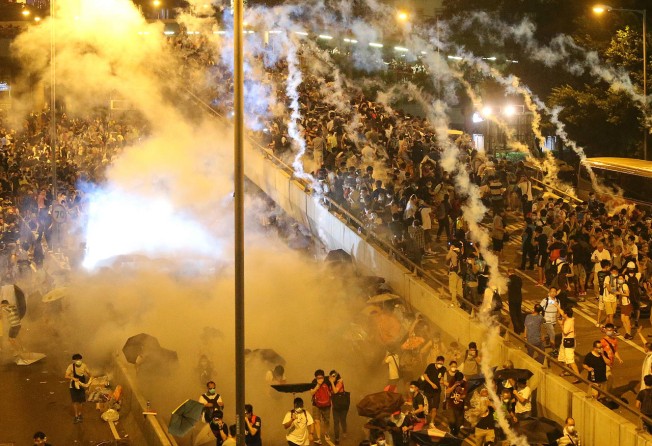
The streets of Central and Admiralty descended into chaos last night after police in riot gear fired tear gas at protesters as the Occupy Central campaign, a movement that promised "peace and love", escalated.
By midnight there was little sign of the mass protest ending. Thousands of protesters, despite police use of pepper spray, batons and tear gas, occupied the main roads outside the government headquarters complex in Admiralty. Many joined in after hearing of the confrontation from the media, and a smaller blockade began late last night in Causeway Bay, while hundreds occupied a section of Nathan Road in Mong Kok.
But Occupy co-organiser Dr Chan Kin-man urged the protesters to retreat. "It is a matter of life and death … Retreating does not mean giving up … Occupy Central has succeeded as long as the spirit of democracy never dies."
He said it was time to plan the next step of the campaign.
Cardinal Joseph Zen Ze-kiun, who supports the Occupy Central campaign, said: "We do not want to see anyone get hurt."
Images of officers carrying shotguns, wearing gas masks and chasing protesters in the streets of one of the world's safest metropolises shocked millions watching around the world.
With traffic and public transport in Central and Admiralty at a standstill, there were doubts as to whether the financial centre would open for business today.
Watch: Police fire tear gas at protesters outside Hong Kong government offices
Protesters vowed to escalate their action and student leaders urged workers to strike and shops to close. They said they would boycott classes until Chief Executive Leung Chun-ying resigned and Beijing gave "genuine universal suffrage" to Hong Kong.
The Professional Teachers' Union, which has 90,000 members, and the pro-democracy Confederation of Trade Unions echoed the call for strikes.
On the other side, the authorities in Hong Kong and Beijing condemned the protests as illegal and promised firm action. A Hong Kong government spokesman last night urged Occupy Central co-organiser Benny Tai Yiu-ting to honour his earlier promise and end the protest for the sake of Hong Kong's interests and the safety of participants.
Organisers had always said the movement would be peaceful. Tai said last month he would stop the protests if there was violence. Tai, a University of Hong Kong law scholar, admitted the campaign was out of control.
"Nobody can stop the protest now. They may only stop if CY Leung steps down," he said.
The last time police had fired tear gas was during the 2005 anti-globalisation protests. Then, the Hong Kong public were largely spectators as officers battled militant South Korean protesters during a World Trade Organisation ministerial conference.
This time, the city's police were pitted against young, local protesters. The scenes left Hongkongers traumatised and shell-shocked. One protester, 13-year-old Matthew Chau, said: "I can't believe police would resort to tear gas … My eyes hurt so bad."
Police chief Andy Tsang Wai-hung defended the use of tear gas, saying police had a responsibility to "resume social order".
As emotions ran high, wild rumours circulated. Some claimed officers fired rubber bullets at the crowd and that the PLA had been deployed to put down the demonstration.
A government spokesman denied the rumours and said Hong Kong did not ask the PLA for help.
Scholarism convenor Joshua Wong Chi-fung and other student leaders were released last night after being detained for about 40 hours. At least 78 people - including three pan-democrat lawmakers - were arrested and 26 people were taken to hospital.
Occupy leaders announced the immediate launch of the long-planned civil disobedience campaign in the early hours of yesterday. The decision was spurred by clashes at government headquarters between police and students.
The protests were triggered by Beijing's ruling last month that Hong Kong would be able to use one man, one vote to elect the chief executive in 2017, but only two or three candidates could run and they would need majority support from a nominating committee.
